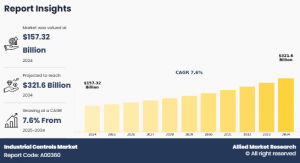Industrial Controls Market Estimated to Experience a Hike in Growth By 2034
Industrial Controls Market Expected to Reach $321.6 Billion by 2034
Download Research Report Sample & TOC: https://www.alliedmarketresearch.com/request-sample/459
The main aim of industrial control is to automate, monitor, and optimize industrial processes to enhance efficiency, safety, and productivity. Industrial control systems (ICS), including SCADA, PLC, and DCS, ensure precise control over machinery, production lines, and critical operations across industries such as manufacturing, energy, oil & gas, and utilities. By integrating real-time data monitoring, predictive maintenance, and automated decision-making, industrial control minimizes downtime, reduces operational costs, and improves overall system reliability. Additionally, modern Factory Automation solutions incorporate AI, IoT, and cybersecurity measures to enhance automation, protect infrastructure, and enable remote operations. Ultimately, industrial control aims to streamline production, improve quality, ensure regulatory compliance, and create smarter, more resilient industrial environments.
Furthermore, Industrial control offers several advantages, including enhanced automation, improved efficiency, and increased productivity across industries. By integrating SCADA, PLC, and DCS, industrial control systems enable real-time monitoring, predictive maintenance, and precise process control, reducing downtime and operational costs. These systems also enhance safety and regulatory compliance by minimizing human intervention and ensuring consistent quality. Additionally, with advancements in AI, IoT, and cybersecurity, industrial control systems now offer remote monitoring, data-driven decision-making, and enhanced security against cyber threats.
The growing need for energy-efficient industrial operations is a key driver for the Industrial Control market. Industries are under pressure to optimize processes, reduce energy consumption, and lower operational costs. Advanced control systems such as DCS, PLC, and SCADA help monitor and regulate energy use in real-time, ensuring optimal performance. Moreover, smart automation technologies enable predictive maintenance, reducing equipment failures and improving efficiency. With industries prioritizing sustainability and regulatory compliance, the adoption of industrial control solutions is accelerating, allowing companies to minimize waste, enhance productivity, and achieve long-term cost savings through improved energy management.
Get Customized Reports with you're Requirements: https://www.alliedmarketresearch.com/request-for-customization/459
However, a major challenge in the industrial control market is the shortage of skilled professionals who can implement and manage advanced control systems. As automation technologies become more complex, industries require engineers and IT specialists proficient in control system programming, cybersecurity, and real-time monitoring. However, the lack of specialized training programs and the rapid evolution of industrial automation create a talent gap. Moreover, companies often struggle to find experienced personnel who can integrate new control systems with legacy infrastructure. This skills shortage slows down adoption and increases operational risks, as improper implementation can lead to inefficiencies and security vulnerabilities.
Furthermore, the increasing adoption of cloud-based industrial control systems presents a significant growth opportunity for the market. Cloud-enabled control solutions offer scalability, remote monitoring, and seamless integration with Industrial IoT (IIoT) platforms. Moreover, cloud-based SCADA and DCS systems allow industries to analyze real-time data, optimize workflows, and enhance decision-making without heavy on-site infrastructure investments. Additionally, cloud connectivity enables predictive analytics and remote troubleshooting, reducing downtime and maintenance costs. As industries shift toward digital transformation, cloud-based industrial control systems provide a flexible, cost-effective solution, allowing businesses to enhance automation, improve efficiency, and drive innovation across various industrial applications.
The industrial controls market is segmented based on control system, component, end user, and region. On the basis of control systems, the Industrial Controls Market Size is categorized into Programmable Logic Controllers PLCs, Distributed Control Systems (DCS), Supervisory Control and Data Acquisition (SCADA), and Others. Based on components, Industrial Controls Market Growth is categorized into Surge Protectors, Enclosure Products, PCB Connectors and Terminals, Power Supplies, Industrial Ethernet, and Others. By end user, the Industrial Controls Market Trends is classified into automotive, utility, Electronics & Semiconductors, mining, and others. Region-wise, Industrial Controls Market Analysis is analyzed across North America, Europe, Asia-Pacific, and LAMEA.
Inquiry before Buying: https://www.alliedmarketresearch.com/purchase-enquiry/459
Key Findings of The Study
- In 2024, the Distributed Control Systems (DCS) segment accounted for the maximum revenue and is projected to grow at a notable CAGR of 6.1% for the Industrial Controls Market Opportunity during the forecast period.
- The Industrial Ethernet segment was the highest revenue contributor to the Industrial Controls Industry in 2024.
- The Electronics and Semiconductors segments accounted for the highest Industrial Controls Market Share revenue in 2024.
- The Asia-Pacific region dominates the market in 2024.
The key players profiled in this report are Siemens AG, ABB Ltd, Mitsubishi Electric Corporation, Schneider Electric, Honeywell International Inc., Rockwell Automation, Inc., Emerson Electric Co, Omron Corporation, KEYENCE CORPORATION, and Yokogawa Electric Corporation.
About Us:
Allied Market Research is a top provider of market intelligence that offers reports from leading technology publishers. Our in-depth market assessments in our research reports take into account significant technological advancements in the sector. In addition to other areas of expertise, AMR focuses on the analysis of high-tech systems and advanced production systems. We have a team of experts who compile thorough research reports and actively advise leading businesses to enhance their current procedures. Our experts have a wealth of knowledge on the topics they cover. Also, they use a variety of tools and techniques when gathering and analyzing data, including patented data sources.
Contact Us:
David Correa
1209 Orange Street,
Corporation Trust Center,
Wilmington, New Castle,
Delaware 19801 USA.
Int'l: +1-503-894-6022
Toll Free: +1-800-792-5285
Fax: +1-800-792-5285
help@alliedmarketresearch.com
David Correa
Allied Market Research
+ 1800-792-5285
email us here
Visit us on social media:
LinkedIn
Facebook
YouTube
X
Legal Disclaimer:
EIN Presswire provides this news content "as is" without warranty of any kind. We do not accept any responsibility or liability for the accuracy, content, images, videos, licenses, completeness, legality, or reliability of the information contained in this article. If you have any complaints or copyright issues related to this article, kindly contact the author above.
Sam Sammane on 95% AI Adoption in Life Sciences; TheoSym Ready to Support the Industry’s Next Big Transition
Sam Sammane Backs Abu Dhabi’s HELM Launch, Cites TheoSym’s Role in Advancing AI Drug Discovery and Longevity Research
'This Heat Can Kill’: Rony Jabour Urges Protection for Construction Crews Nationwide
Kalendarium
Więcej ważnych informacji
 Jedynka Newserii
Jedynka Newserii

 Jedynka Newserii
Jedynka Newserii

Ochrona środowiska

Polskie przedsiębiorstwa otwarte na transformację w kierunku gospodarki obiegu zamkniętego. Nowa mapa drogowa mogłaby w tym pomóc
Do 2030 roku z gospodarki o obiegu zamkniętym ma pochodzić co czwarty surowiec. Aby przyspieszyć ten proces, w Polsce potrzeba nowej, międzysektorowej Mapy Drogowej dla Gospodarki o Obiegu Zamkniętym – wskazywali eksperci w trakcie Polish Circular Forum. Obecny dokument nie spełnia już swojej roli i wymaga aktualizacji. Na braku jasnych przepisów i systemu wsparcia najbardziej cierpią przede wszystkim małe i średnie przedsiębiorstwa. – Z naszych badań wynika, że tylko 3–3,5 proc. firm z sektora MŚP jest świadomych i przygotowanych do transformacji – ocenia Agnieszka Zdanowicz, wiceprezes Klastra Gospodarki Cyrkularnej i Recyklingu.
Prawo
Wspólna polityka rolna do deregulacji. Trwają prace nad uproszczeniami dla rolników

Prawie 1,6 mld euro – tyle mają wynieść roczne oszczędności dla rolników po uproszczeniu wspólnej polityki rolnej. Zaproponowany w maju przez Komisję Europejską pakiet zmian zakłada redukcję części obowiązków administracyjnych, które dziś spoczywają na rolnikach ubiegających się o unijne wsparcie. Szczególnie dotyczy to płatności dla drobnych rolników. Jak podkreślają eksperci, wszelkie zmiany, które będą działać na rzecz konkurencyjności unijnego rolnictwa, są wskazane, ale przy uwzględnieniu wysokiego poziomu bezpieczeństwa żywności.
Polityka
W rosyjskiej niewoli może przebywać kilkadziesiąt tysięcy Ukraińców. Napięta sytuacja geopolityczna sprzyja Rosji

W rosyjskiej niewoli przebywa około 10 tys. obywateli Ukrainy, z czego ponad 8 tys. to żołnierze. Łącznie jednak może ich być nawet kilkukrotnie więcej. ONZ podaje, że ponad 95 proc. ukraińskich jeńców wojennych jest poddawanych torturom. – Pogarszająca się sytuacja międzynarodowego bezpieczeństwa i wzrost wpływów do budżetu Federacji Rosyjskiej ze względu na wzrost cen ropy mogą się negatywnie odbić na planowanych wymianach jeńców – ocenia Michał Dworczyk, wiceprzewodniczący Komisji Bezpieczeństwa i Obrony w Parlamencie Europejskim.
Partner serwisu
Szkolenia

Akademia Newserii
Akademia Newserii to projekt, w ramach którego najlepsi polscy dziennikarze biznesowi, giełdowi oraz lifestylowi, a także szkoleniowcy z wieloletnim doświadczeniem dzielą się swoją wiedzą nt. pracy z mediami.









.gif)

 |
| |
| |
|